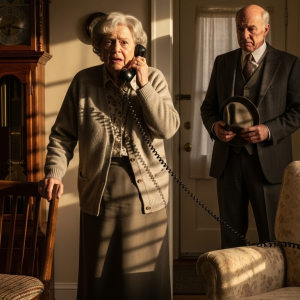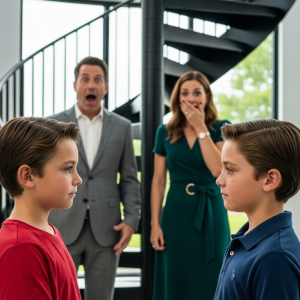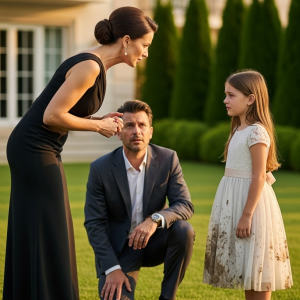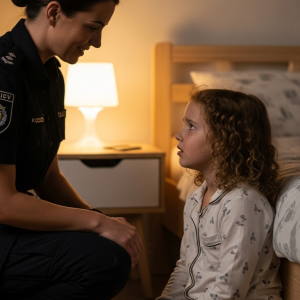My name is Lucian Carter, and at thirty-seven, the life I’ve built in Seattle is a fortress of steel and glass, designed to shield me from the ghosts of my past. But to understand the man I am, you must first travel back with me to Franklin, Pennsylvania—a town where memories, both beautiful and brutal, still whisper to me on rainy nights.
Franklin in the 1980s was a Rockwell painting come to life, with tree-lined streets and welcoming wooden houses. Our home was different—an old manor whose grand walls seemed to hold the echo of my mother’s laughter. Eleanor Carter was not just my mother; she was my sun. Her smile was the dawn, and her hands were always ready with an embrace, teaching me how to fold the delicate wings of a paper crane, how to find stories in the sunset, and how to believe that this world, for all its cruelty, was still filled with magic.
My most vivid memories are of our sun-drenched kitchen, the air thick with the scent of cinnamon and sugar as she told me fairy tales. My father, James Carter, was the founder of Carter Enterprises, a real estate magnate as prosperous as he was absent. But when he was home, he brought with him small treasures—a toy car, a picture book, and a hug that made me feel like the center of his universe.
When I was eight, the light went out. Breast cancer. The words were a clinical, sterile blade that carved up our world. The illness was a merciless thief, stealing my mother from us over the course of a single, agonizing year. I can still see her in that sterile hospital bed, her light dimming but her smile fighting to reach me. We were folding one last paper crane, her fingers weak, guiding mine.
“Lucian,” she said, her voice a fragile whisper against the hum of the machines. “You must be strong, do you understand? I will always be right here… in your heart.” Those were her final words to me before she slipped into a sleep from which she would not wake.
Her funeral is a watercolor memory, blurred by rain and a grief so total I felt disconnected from my own body. I remember the sound of weeping, the steady drum of rain on a sea of black umbrellas, and an emptiness so vast it felt as if the world had collapsed, with me at its core. My father, my titan of strength, held me so tightly I could feel the tremors running through his entire body. I didn’t know it then, but it would be the last time I would truly feel his warmth.
After my mother’s death, my father changed. He did not break; he petrified. He poured himself into his work, using billion-dollar deals and corporate strategy as a bulwark against his grief. I became a ghost in my own home, wandering the vast, cold halls of our estate, seeking comfort in the remnants of her: a silk scarf that still held her scent, a diary filled with her elegant script, a box of paper cranes we had made together.
When I was ten, Vivien arrived. She was tall and slender, with blonde hair styled in a perfect, rigid helmet and eyes as sharp and cold as chips of ice. She swept into our home with her two children, Khloe and Elias, like a conquering general. My father called her my “new mother,” but I knew from her first, thin smile that she could never replace the one I had lost.
Vivien brought with her an era of cold, calculated order. The lingering warmth of my mother’s memory was systematically erased. Furniture was rearranged, menus were dictated, and my father, seemingly mesmerized by her brittle beauty, failed to see that I was being systematically pushed to the fringes of my own family.
Khloe, two years my senior, looked like a porcelain doll but had a tongue like a razor blade. Elias, a year my junior, was a brutish thug who found joy in my misery. They made it their mission to ensure I understood I was an interloper. “Look at the little orphan,” Khloe would sneer the moment our parents were out of earshot. Elias preferred physical torment—a shove on the stairs, my toys methodically broken, his laughter a grotesque, gleeful sound.
Vivien was no passive observer; she was the conductor of this cruel orchestra. Her criticisms were wrapped in sickly sweet poison. “Lucian, dear, why can’t you be more like Khloe and Elias?” she would coo, her voice laced with false sweetness. “They are so much better behaved.” I once overheard her telling my father I was “the extra child,” a walking, breathing reminder of the woman she was determined to erase.
I tried to tell him. I tried to explain the taunts, the bruises, the crushing loneliness. But he would just wave a tired hand, his eyes distant. “You need to adjust to the new family, Lucian. Vivien is a good woman. Just give it time.” He wasn’t a bad man; he was a broken one, desperately trying to build a new life from the wreckage of his grief. But every dismissal was another lock clicking into place on the wall between us.
The years that followed were a long, slow suffocation. I retreated into myself at school, becoming the “weird kid” who sat alone at lunch, folding paper cranes and writing in a tattered notebook. At home, the torment was relentless.
When I was twelve, Elias found it: the special paper crane, the last one my mother and I had folded together in the hospital. I kept it on my bedside table, a sacred relic. He picked it up, a malicious grin spreading across his face, and methodically tore it to shreds in front of me.
Something inside me snapped. I launched myself at him, a whirlwind of fists and tears. I wasn’t just fighting Elias; I was fighting for the last piece of my mother he was trying to destroy. Vivien appeared in the doorway like an apparition. Without a word, she strode forward and struck me across the face, the sound of her hand cracking in the quiet hallway.
“How dare you attack my son, you feral little wretch!” she shrieked, pulling Elias into a protective embrace as if he were the victim.
When my father heard her version of the story, he simply sighed, his shoulders slumping in defeat. “Apologize to your brother, Lucian.” I refused. I ran to my room, locked the door, and cried until there were no tears left. That was the night I began to plan my escape.
One evening when I was thirteen, searching for an old book, I found my mother’s diary tucked away in a dusty corner of the library. Her words were a lifeline thrown across the years. She wrote of her boundless love for me, of her dreams for me to grow into a strong and compassionate man.
My Lucian, one entry read, you are my greatest treasure. Never let anyone, for any reason, make you feel that you are worth anything less than the entire world. I clutched the words to my chest like a prayer. The diary became my secret solace, and I made a silent promise to her, and to myself: one day, I would get out.
My high school years were an exercise in silent endurance. I buried myself in my studies, not to please my father, but because I knew that knowledge was my only tool, my only path to freedom. When I was sixteen, my father summoned me to his study. Surrounded by the stern portraits of Carter ancestors, he spoke of legacy. “Lucian, you are my heir,” he said, his voice heavy with a pride I no longer felt connected to. “This company will all be yours one day.” It felt less like a promise and more like a cage.
Vivien, predictably, was furious. I overheard her arguing with him late one night. “He’s not ready! He’s weak! Elias has real leadership in him.” Elias, the tormentor whose only skill was cruelty, was her idea of a leader.
At seventeen, a letter arrived that changed everything. An acceptance, with a full academic scholarship, to Carnegie Mellon University. It was a beacon of hope in a dark world. The night before I left, I packed my mother’s diary and a single, tattered paper crane I had painstakingly taped back together. I looked at my reflection—a boy forged in the crucible of grief and neglect—and swore the past would not define me. I got on a bus at dawn, leaving a fog-shrouded Franklin behind. At eighteen, I was broke and alone, but I had something Vivien and her children could never touch: hope.
College was a baptism by fire. The scholarship covered tuition, but not living expenses. I found a job as a barista, the hiss of the espresso machine and the smell of roasted beans becoming the soundtrack to my new life. It was there, serving coffee to strangers, that I learned to smile again, to listen to their stories, to rejoin the human race.
I majored in business, partly for my father, but mostly for me. I wanted to prove that I could build something great, on my own terms. My father’s calls were infrequent and awkward, strained conversations across a chasm of unspoken words. Vivien never called. Their indifference, once a constant source of pain, now felt like a distant echo. I was building my own world.
In my sophomore year, I joined the entrepreneurship club. I pitched an idea for affordable, sustainable housing developments. It took second place in a university-wide competition. For the first time, I felt the thrill of my own potential, separate from the Carter name.
A letter from Franklin arrived soon after. It was from Vivien. James insists you should consider a job at Carter Enterprises after you graduate, she wrote, her condescending tone dripping from every word. Though I’m not sure you have what it takes. I tore it into a thousand pieces. I was never going back.
At my graduation, I stood alone. My father didn’t come. He sent a card with a check inside, which I never cashed. I left Pittsburgh with a degree and a dream, determined to go as far west as I could, to Seattle, a city as far from Franklin as I could get.
But just as I was ready to start my new life, my father called. His voice was heavy, urgent. “Lucian, I need you to come home. Carter Enterprises needs you. You’re my heir.” Every instinct screamed no. But there was a broken, pleading quality in his voice, and a foolish, lingering part of me still yearned for the father I had lost. I agreed to return.
Walking back into that house was like stepping back into a nightmare. Vivien’s fake smile, Elias’s smug smirk, Khloe’s disdainful glare—it was all there. My father gave me a title—Junior Project Manager—but it was clear Vivien and Elias ran the show. They gave me menial tasks, treating me like an overpaid intern, and I watched in horror as they ran my father’s company into the ground, morally speaking.
Carter Enterprises, once a pioneer in community-focused development, was now a soulless machine churning out luxury resorts and high-end condos, all driven by Vivien’s insatiable greed. The breaking point came during a board meeting for a new resort project that required demolishing an entire low-income neighborhood.
I had to speak up. I presented an alternative plan: a revitalization project with affordable housing and jobs for the local community. “This is about more than profit,” I said, looking directly at my father. “It’s about our responsibility.”
The room was silent. Elias sneered. Vivien applauded softly, as if at a play. My father just sighed, the sound of utter defeat. “Lucian, you’re too idealistic. Elias’s project is approved.”
I walked out. That night, I called Sarah, a friend from college who had become my closest confidante. “I don’t belong here,” I told her, my voice breaking. “You don’t have to prove anything to them, Lucian,” she said softly. “You are enough, just as you are.” Her words were the strength I needed.
The next morning, I went to my father’s office to tell him I was leaving for good. I found him slumped over his desk, clutching a faded photograph of my mother. He looked up, his eyes filled with a deep, weary sorrow. “Lucian,” he whispered. “I’m sorry. I haven’t been the father you deserved.” It was the first crack in his armor I’d seen in years. But it was too little, too late. I placed a resignation letter on his desk and was gone by dawn, the pain of the past mixing with the exhilarating taste of freedom.
I chose Seattle because it was on the other side of the continent, a place to be reborn. I started at the bottom, an assistant at a small firm called Green Horizon that focused on the very causes I championed. The owner, a gruff but kind man named Harold Christy, saw something in me. “You’ve got vision, kid,” he told me. “Don’t ever let anyone tell you otherwise.”
Under his mentorship, I thrived. I poured all the pain and determination of my past into my work. I wanted to build things that helped people, things my mother would have been proud of. I wanted to create a legacy that had nothing to do with the Carter name.
Three years later, I stood at the opening ceremony of a community complex I had designed and managed—a project with affordable housing, a park, and a learning center. As I watched children playing on a patch of land that had once been a derelict lot, I felt a warmth spread through my chest. I felt my mother’s presence, her smile of approval. I had done it.
Then, one morning, the past called. A woman’s voice on the phone, calm and professional. A registered nurse. “Mr. Carter? I’m calling from Franklin General Hospital. It’s about your father, James Carter. He’s passed away. There are some important matters to discuss.”
The funeral was a somber affair of downcast eyes and murmured condolences. Vivien, Khloe, and Elias stood by the casket, a perfect portrait of performative grief. As I approached to pay my respects, Vivien stepped in front of me, a physical barrier.
“Lucian,” she said, her voice a velvety threat. “What are you doing here?”
“I’m here for my father,” I said, my voice steady.
“You are not to go near him,” she spat, her eyes blazing with hatred. “You are not family anymore.” Her words should have hurt, but fifteen years of her poison had forged an armor she couldn’t pierce.
“You don’t get to decide who my father’s family is, Vivien. Now, if you want to stop me, you’d better call the police. I know my rights.” The confrontation was brief and brutal. She backed down, her face contorted in a silent snarl.
After the service, as I was preparing to leave Franklin for the last time, a woman in a pale green coat approached me in my hotel lobby. It was the nurse who had called me. She handed me a thick, sealed envelope. “This is what Mr. Carter wanted you to have,” she said, her eyes full of a strange urgency. “Be careful. There are people who want to keep the truth from you.”
Back in my room, I opened it. Inside was a handwritten letter from my father and a notarized, official-looking document.
My son, Lucian, the shaky letter began, I am sorry for everything. Vivien manipulated me. She built a wall between us and made me believe you hated me. I was a coward, too weak with grief to fight her. By the time I realized the truth, I was already sick. But I have tried to make it right. This is my true will. I leave everything—the house, the company, all of it—to you. You are the only one I trust. I hope you can forgive me.
The envelope also contained a small audio recorder. I pressed play, and my blood ran cold. It was Vivien’s voice, plotting with a corporate rival, Raymond Holt, to liquidate Carter Enterprises’ core assets for pennies on the dollar after my father’s death. The grief was overwhelming, but underneath it, a core of steel began to form.
The next day, I met with Franklin Ross, my father’s oldest and most trusted attorney. Together, we walked into the law office where Vivien and her children were already meeting with their own lawyer, ready to validate the fake will they had produced. The look of shock on their faces when I walked in was deeply satisfying.
“What are you doing here?” Vivien shrieked, her composure shattering.
“I’m here as the rightful heir of James Carter,” I announced calmly, placing my father’s true will on the polished table. “I have proof that the document you have submitted is a forgery.”
Their lawyer scoffed, but Ross simply slid the notarized will across the table.
“Furthermore,” I continued, my voice low but carrying to every corner of the room, “I have a recording of you, Vivien, conspiring to illegally sell company assets. It’s called corporate espionage. It carries a rather lengthy prison sentence.”
The color drained from her face. Elias lunged towards me, pure rage in his eyes, but was stopped by a sharp word from his lawyer, who now understood the gravity of the situation. He knew they were trapped.
I offered them a deal. They would immediately vacate my family home, resign from the company, leave Franklin, and never return. They would disappear from the Carter legacy forever. In exchange, I would not press criminal charges. After a tense, whispered conference, they accepted. I never saw them again.
I didn’t want the house, filled as it was with too many ghosts. I converted my childhood home into the Eleanor Carter Community Center, a place for art, learning, and hope, in honor of my mother.
As for Carter Enterprises? I took the helm. I sold off the soulless luxury resort developments and refocused the company on my father’s original vision, championing projects that built communities instead of just profits. I brought Harold Christy on as a senior advisor, and together, we began to heal the company’s soul.
My story isn’t about inheriting a fortune. It’s about reclaiming a legacy. The real legacy wasn’t the money or the company; it was the values my parents had given me—resilience, compassion, and an unwavering belief that even in the harshest soil, you can still build something beautiful.
Franklin is no longer the prison of my past; it is the foundation on which I have built my future. And sometimes, on quiet nights in Seattle, when the rain patters against the glass of my high-rise office, I take out a single, tattered paper crane, its creases as familiar as my own skin, and I know that my mother, and finally, my father, would be proud.




